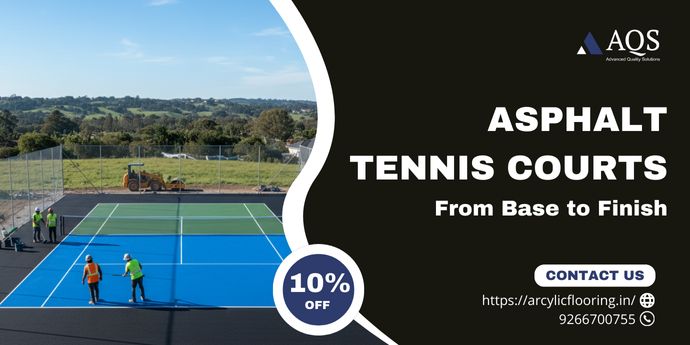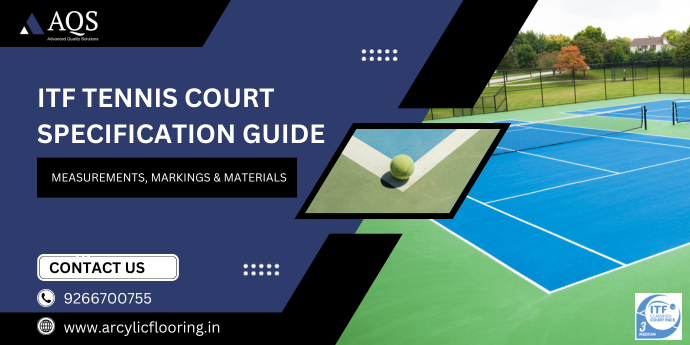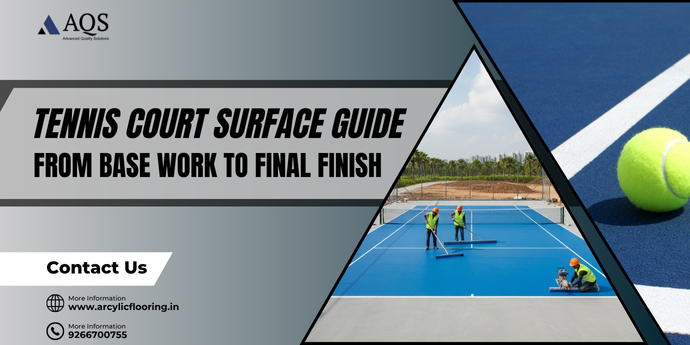In today’s fast paced sports infrastructure landscape, tennis courts are no longer exclusive to elite clubs and international tournaments. Across India and especially in growing states, the demand for good quality tennis court construction is increasing as schools, housing societies, academies and private individuals recognize the value of investing in sports facilities. Among the various options available, asphalt tennis court construction is one of the most reliable and cost effective.
Asphalt has been used for decades as a base material in roadworks, playgrounds and sports facilities. Its strength, flexibility and affordability makes it an ideal choice for tennis court base construction where long term durability and consistent play is crucial. Unlike grass or clay courts which require intense maintenance. Asphalt tennis court provides a solid base that can be finished with synthetic acrylic or cushion systems to give a professional grade surface at a fraction of the cost.
For institutions in India that face diverse climates from scorching summers to heavy monsoons. An asphalt base offers resilience against temperature fluctuations, ground movement and water drainage challenges. When done by experienced tennis court builders. Asphalt gives not just a smooth playing surface but also one that meets international performance standards.
This blog will take you through everything about asphalt based tennis court installation near me. From step by step construction process to material selection, cost, maintenance and resurfacing. Whether you are looking to know how much it costs to build a tennis court or looking for long term savings with minimal repairs, asphalt might be the answer you are looking for.
Asphalt in Tennis Court Base Construction
The tennis court base construction is the backbone of any tennis court project. If the base is poorly designed or built, the entire playing surface suffers. Cracks, water pooling, surface depressions and uneven ball bounce become inevitable, shortening the life of the court and leading to repeated tennis court repair near me searches. So the choice of base material is crucial for both performance and durability.
Among the many options available, asphalt has proven to be one of the most reliable materials for tennis court construction. Its strength, flexibility and affordability makes it the preferred base for both backyard courts and professional level courts. Here’s why asphalt is trusted by modern tennis court builders around the world:
- Strength and Durability: Asphalt has a unique balance of strength and flexibility. Unlike rigid bases that may crack under soil movement or heavy use, asphalt absorbs minor movements without causing surface damage. Perfect for areas with variable soil conditions.
- Smooth Finish: When compacted right, asphalt produces a seamless, uniform surface that’s perfect for applying synthetic finishes like acrylic or cushioned coatings. A smooth base is critical in tennis because it ensures consistent ball bounce and safe player movement.
- Cost Effective: One of the biggest advantages of asphalt is its affordability. Compared to concrete slabs, asphalt is cheaper to install and still provides excellent load bearing capacity. For clients who ask, “How much does it cost to build a tennis court.?” Asphalt helps keep the tennis court construction cost within budget without sacrificing quality.
- Climate Adaptability: Asphalt performs well in areas with extreme temperature fluctuations. Its flexibility allows it to expand and contract slightly without breaking apart, reducing the risk of cracks in extreme heat or during cooler seasons.
Step-by-Step Process of Asphalt Tennis Court Construction
Professional tennis court builders like AQS follow a structured process to make sure high-quality construction:
1. Site Preparation: The tennis court surface is cleared, leveled, and compacted. Proper marking is ensured to create a natural slope for efficient water drainage. In India’s monsoon conditions, this step is critical to stop long-term surface damage.
2. Base Layer Installation: The crushed stone of the collection is laid down and compacted. This layer provides stability, stops soil shifting, and allows for proper drainage beneath the asphalt.
3. Asphalt Laying: Hot mix asphalt is poured and compacted to create a thick, smooth base. Multiple layers may be applied depending on the tennis court’s size and expected usage.
4. Curing and Leveling: The asphalt is allowed to settle and cure. Precision leveling makes sure the surface meets international standards, stops uneven ball bounce.
5. Surface Coating: Once the tennis court is fixed, acrylic resurfacing and color coats are applied to improve grip, aesthetics, and playability. Line markings are painted as the final step.
This process makes sure that the tennis court not only looks professional but also performs at tournament standards.
Cost to Build a Tennis Court with Asphalt Base
One of the most common questions asked by schools, academies, housing societies and even homeowners is: “How much does it cost to build a tennis court?.” The answer varies depending on several factors such as location, design and finishing materials. When you opt for asphalt tennis court construction, the cost becomes more manageable as asphalt is both durable and cost effective compared to other foundation materials. Let’s break down
- Base: The foundation or tennis court base construction is one of the biggest cost contributors. Asphalt is more affordable than reinforced concrete but still provides excellent strength and flexibility. Concrete bases are rigid and durable but costlier to install, asphalt gives a smoother surface at a lower cost.
- Tennis Court Material: Once the asphalt base is laid, the choice of tennis court material on top affects the overall cost. Acrylic coatings are the most budget friendly and widely used, offering weather resistance and consistent bounce. Premium options like PU or modular tile systems can increase the tennis court construction cost.
- Location & Size: The cost also depends on whether you are building a backyard tennis court or a full scale academy facility. Backyard courts being smaller requires less asphalt, coating and fencing which reduces the cost. Institutional or tournament size courts require larger land area, advanced drainage and high quality finishes which increases the final cost.
- Extra Features: Many clients overlook the role of add-ons in the total tennis court construction cost. While the asphalt base is essential, extras like fencing, floodlights, seating arrangements and even roofing for all weather play can add several lakhs to the cost.
- Average Cost: In India, the cost to build a tennis court with asphalt base typically ranges depending on features and finishing. This cost includes site preparation, base construction, surfacing layers and line markings.
Asphalt Tennis Court Advantages
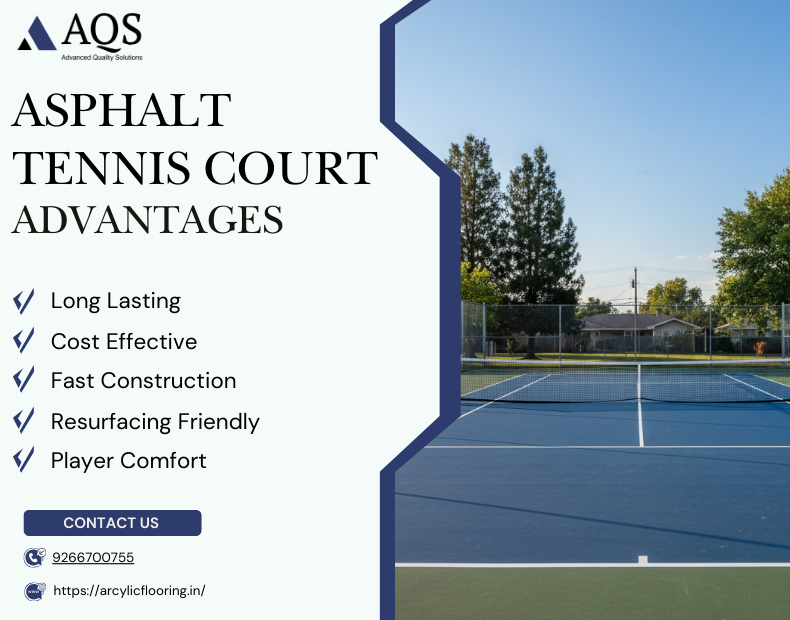
- Long Lasting: One of the biggest advantages of asphalt tennis courts is their long life. When sealed and finished with high quality acrylic coatings, asphalt courts can last for decades. Asphalt is more flexible and can absorb small ground movements without cracking as much as a concrete base.
- Cost Effective: Cost is always a major factor in any tennis court project and asphalt is a big winner here. Compared to concrete or premium modular systems, asphalt requires less raw materials and less complex installation which means lower tennis court cost.
- Fast Construction: Another big benefit of asphalt is the speed of construction. Asphalt courts can be built and ready for surface coatings much faster than concrete based systems which often require longer curing times. This means institutions can have courts ready to use in weeks not months and save time and project costs.
- Resurfacing Friendly: Over time every tennis court will need resurfacing but asphalt bases are the easiest to resurface. They provide a stable base for tennis court resurfacing materials so contractors can renew the surface without extensive reconstruction.
- Player Comfort: Performance and player safety is just as important as durability and cost. When asphalt courts are combined with modern cushion coats they provide excellent balance of firmness and shock absorption. This reduces the impact on knees, ankles and joints so players can practice and compete without strain.
Tennis Court Resurfacing and Repair
Even the strongest and most carefully built tennis courts eventually require maintenance. An asphalt base may last for decades, but the top layers of acrylic or synthetic coatings are constantly exposed to heat, rain, dust, and heavy play. Over time, this leads to wear and tear that impacts both performance and aesthetics. That’s why regular resurfacing and minor repairs are an essential part of tennis court construction.
If you often search for “tennis court resurfacing near me” you’re already aware of how important upkeep is for extending the life of your facility. Partnering with professionals like AQS ensures that your court not only looks brand new but also performs at international standards year after year.
- Resurfacing Timeline: Acrylic coatings and cushion layers typically start showing signs of fading or reduced grip after several years of play and weather exposure. To keep your court safe and consistent, resurfacing is recommended every 5–7 years.
- Crack Repair: Heat expansion in summer and contraction during winters or monsoons can cause small cracks to appear on the asphalt base. If these cracks are left unattended, they quickly expand, creating uneven surfaces and waterlogging issues.
- Line Repainting: Line markings are not just for aesthetics—they are critical for accurate play. Over time, heavy usage and exposure to dust and rain cause lines to fade, making it difficult for players to judge boundaries.
- Aesthetic Renewal: A tennis court is also a visual centerpiece for any school, club, or housing society. Faded, dull, or stained surfaces give a neglected impression and discourage regular use. Through resurfacing, the court regains its vibrant colors, smooth texture, and fresh appearance.
Why Choose AQS for Asphalt Tennis Court Construction
When it comes to asphalt tennis court construction, choosing the right partner is as important as choosing the right material. AQS (Advanced Quality Solutions) has built a strong reputation as one of India’s leading sports infrastructure specialists, offering tennis court installation near me. With decades of combined experience, certified products and focus on precision. AQS ensures every court is designed for durability, safety and international level performance.
- Expertise in Asphalt Tennis Court Construction: AQS has a team of experienced engineers, surface specialists and professional tennis court builders who understand the technical requirements of tennis court base construction. From soil compaction to asphalt laying, slope grading and acrylic finishing every step is handled with precision.
- Certified Materials: The material used in construction defines how long a tennis court lasts. AQS uses only ITF approved and ISO certified tennis court materials which ensures international quality and safety standards.
- Services: Clients choose AQS because they don’t just construct bases they deliver complete turnkey solutions. From tennis court base construction with asphalt to surfacing, line marking, fencing, lighting and even long term maintenance AQS manages the project from start to finish.
- Pricing: Budgeting is one of the biggest concerns in tennis court construction costs especially for schools and housing societies. AQS provides detailed cost breakdown so clients know where their money is going whether it’s for base preparation, materials, coatings or add-ons.
- Proven Track Record Across India: With projects delivered for schools, housing societies, sports clubs and academies across India. AQS has earned its reputation as a reliable tennis court construction company.
Conclusion
Asphalt is still the favourite for professional and recreational courts worldwide. It’s affordable, strong and can withstand all kinds of climate. For Indian conditions, it’s the most practical choice. With the right finishing layers and periodic tennis court resurfacing, an asphalt court can last for decades and give consistent bounce, grip and player safety.
This is where AQS (Advanced Quality Solutions) makes a difference. With expertise in tennis court base construction, ITF certified tennis court material and years of experience as trusted tennis court builders, AQS ensures every project is delivered with precision. From planning and site preparation to construction, coating and maintenance, AQS provides end to end solutions for schools, academies, clubs and private homeowners.
So whether you are a sports academy planning to set up a professional facility. A housing complex adding recreational amenities or an individual homeowner looking to have a backyard court. Asphalt is the most reliable choice. And with AQS, you’re not just building a tennis court—you’re building a safe, durable and professional grade surface that will last for years to come.
Looking for affordable, durable and professional asphalt tennis court construction? Contact AQS today to start your project with confidence.
Frequently Asked Questions
Yes, asphalt is used as a strong and cost effective base for tennis courts.
Asphalt base with synthetic acrylic surfacing is the most economical and cheapest option to build tennis court.
A tennis court can be resurfaced 4-5 times in its lifetime.
Tennis courts are built with asphalt or concrete base and synthetic acrylic top layer.
Synthetic acrylic hard courts are best for durability, consistency and all weather play.


